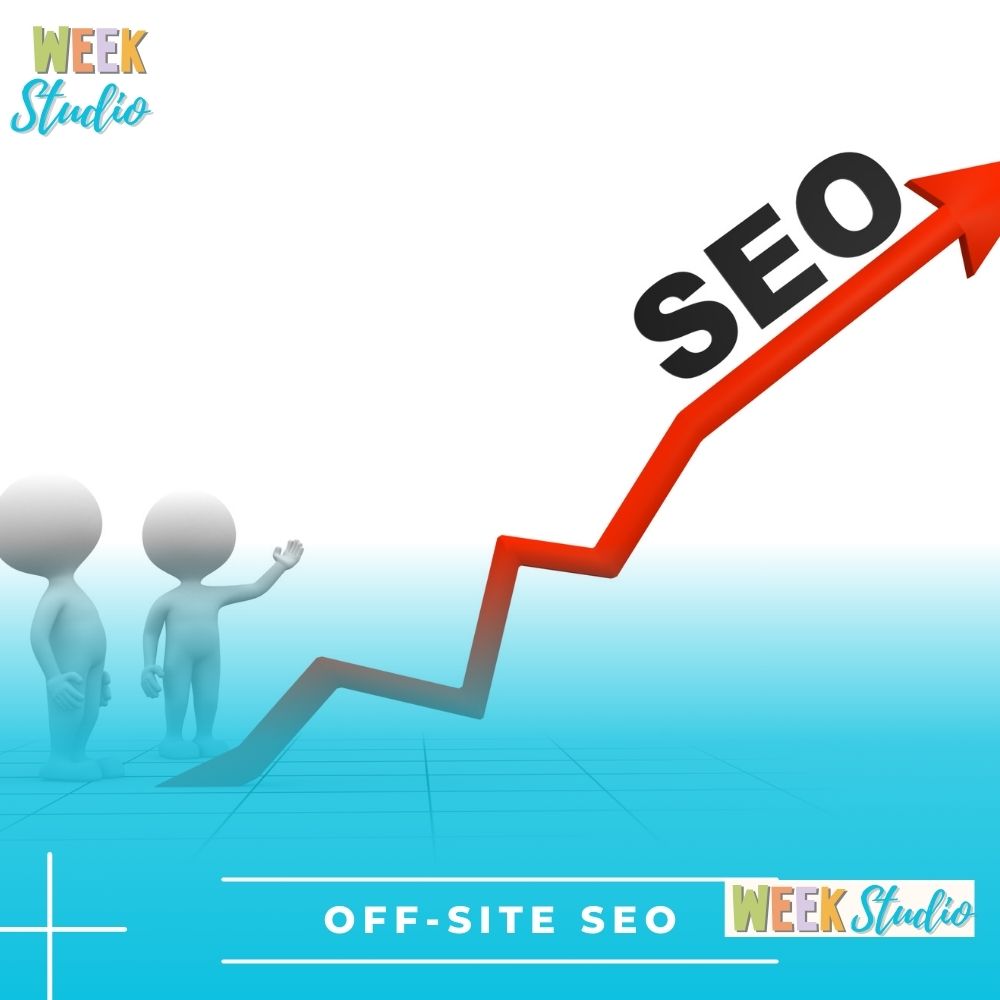In the dynamic landscape of the digital realm, where competition for online visibility is fierce, understanding the intricacies of Search Engine Optimization (SEO) becomes paramount. While many are familiar with the on-site elements of SEO, such as keyword optimization and meta tags, off-site SEO plays an equally crucial role in determining a website’s success in search engine rankings.
So, what exactly is off-site SEO, and why does it matter? In this article, we’ll delve into the world of off-site SEO, exploring its significance, core principles, and providing tangible examples that showcase its impact on a website’s search engine performance. Strap in as we unravel the mysteries of off-site SEO and discover how it can be a game-changer for your online presence.
What Is Off-Site SEO

Off-site SEO is the process of optimizing a website to rank higher in search engine results pages (SERPs), through the use of external links and other measures. The goal of off-site SEO is to improve a website’s authority and visibility, which will in turn result in more visitors and higher traffic levels. Off-site SEO is often confused with link building, which is the process of acquiring links from other websites. However, off-site SEO encompasses a wider range of activities, including social media marketing, content marketing, and influencer marketing.
There are a number of factors that go into off-site SEO, including the quality and quantity of links, the relevance of the content, and the authority of the websites linking to you. However, the most important factor is the quality of the content on your website. If your website is full of high-quality, relevant content, other websites will be more likely to link to you.
How Do I Create An Offsite SEO?
There are a few things to consider when creating an offsite SEO. One of the most important is making sure your website is linked to from high-quality websites. You’ll also want to make sure your website’s content is high-quality and keyword-rich. You can also promote your website by submitting articles to article directories and by submitting press releases. You can also create social media profiles for your website and promote your website on social media.

There are many ways to improve a website’s ranking, but one of the most important is to create an offsite SEO strategy. This is a strategy that focuses on getting links to the website from other websites. The more links, the better. There are a few things business owners can do to create an offsite SEO strategy. This content can be in the form of blog posts, articles, or whitepapers. Another thing business owners can do is participate in social media.
This allows them to share their content with a larger audience, and it also gives them the opportunity to interact with customers and potential customers. Finally, business owners can use tools like Google Webmaster Tools to help them track their website’s search engine rankings.
What Is An Example Of On Site SEO?

On-site SEO, or on-page SEO, is the practice of optimizing individual webpages on your site so that they rank higher in search engine results pages (SERPs). On-site SEO is the practice of optimizing individual webpages on your site so that they rank higher in search engine results pages (SERPs). While off-page SEO is important, on-page SEO is still one of the most important aspects of SEO.
When it comes to on-page SEO, there are a few key things to keep in mind. First, make sure your page is indexable by search engines. Second, make sure you include the right keyword phrases in your title tag, meta description, header tags, and image alt text. And third, make sure your website is fast and mobile-friendly.
Which Of The Following Is An Example Of Off-Page Optimization?

Understanding off-site SEO begins with recognizing the various strategies and techniques that fall under this umbrella. Unlike on-site optimization that focuses on elements within your website, off-page optimization involves activities that occur outside your site but directly impact its visibility and authority.
Backlink Building Strategies
One of the cornerstones of off-site SEO is the art of building quality backlinks. Backlinks, or inbound links, are links from other websites that direct users to your pages. The quality and relevance of these backlinks significantly influence search engines in assessing your site’s credibility.
- Gaining a backlink in return, boosting your site’s authority.
Influencer Outreach:
- Collaborating with influencers or industry leaders.
- Securing backlinks through their endorsement or mention.
Social Media Signals:
- Leveraging social media platforms to promote your content.
- Increased social shares and engagement contribute to off-site SEO.
The Role of Content in Off-Page SEO
Content isn’t confined to on-site efforts; it plays a pivotal role in off-page SEO too.
Creating Shareable Content:
- Developing content that resonates with your audience.
- Encouraging social sharing, leading to increased visibility.
Utilizing Infographics and Multimedia:
- Crafting visually appealing content.
- Attracting backlinks as other websites reference and share your multimedia content.
These off-page optimization techniques exemplify how external factors can positively impact your site’s search engine rankings. As we explore further, we’ll delve into case studies to illustrate the real-world effectiveness of these strategies. Stay tuned to uncover the power of off-site SEO in action.
Case Studies: Real-World Off-Site SEO Success Stories

To truly grasp the effectiveness of off-site SEO strategies, let’s explore real-world case studies that highlight their impact on improving search engine rankings and online visibility.
Case Study 1: The Power of Guest Posting
In a study conducted by a leading industry blog, a website specializing in tech reviews significantly improved its search rankings through strategic guest posting. By collaborating with authoritative tech blogs and contributing high-quality content, the website gained valuable backlinks, establishing itself as an industry expert.
Case Study 2: Influencer Outreach Driving Engagement
A fashion e-commerce site increased its online presence by partnering with fashion influencers on social media platforms. These influencers shared their experiences with the brand, creating a buzz within their follower communities. The result? A surge in social media signals and backlinks, contributing to improved search rankings and increased organic traffic.
Case Study 3: Multimedia Content Goes Viral
A travel blog incorporated visually stunning infographics and videos into its content strategy. The shareable nature of these multimedia elements led to widespread distribution across various platforms. As a result, the blog gained organic backlinks from travel enthusiasts and other bloggers, significantly boosting its off-site SEO metrics.
These case studies underline the tangible benefits of off-site SEO techniques, showcasing how strategic implementation can propel a website to new heights in search engine results. As we continue our exploration, we’ll address common off-site SEO mistakes to avoid, ensuring a well-rounded understanding of the optimization process.
What Is Off Page SEO For Beginners?
Off page SEO is the process of optimizing your website to rank higher in search engine results pages (SERPs), through means other than the on page optimization techniques that you use on your own website. These off page SEO techniques include things like link building, social media optimization, and reputation management.
Off page SEO can be a great way to improve your website’s visibility and organic search traffic, but it’s important to keep in mind that it’s not a silver bullet. There is no one off page SEO technique that will magically rank your website #1 in Google, and you’ll need to use a variety of techniques o see results.
Some of the most common off page SEO techniques include link building, social media engagement, and content marketing. Link building is the process of acquiring links from other websites to your own, and it’s one of the most important factors in SEO. The more links you have from high-quality websites, the higher your website will rank in Google.
Social media engagement is also important for off page SEO. By sharing your content on social media and engaging with your audience, you can generate more links and social media shares, which will help improve your website’s visibility. Finally, content marketing is one of the most important off page SEO techniques. By creating high-quality content that engages your audience, you can attract more visitors to your website and improve your SEO.
What Is Off-Site SEO Vs On Site SEO?
SEO is the process of optimizing a website to rank higher in search engine results. On-site SEO is the process of optimizing a website’s content, structure, and metadata to rank higher in search engine results. Off-site SEO is the process of optimizing a website’s link profile to rank higher in search engine results. Both on-site SEO and off-site SEO are important for ranking a website in search engine results.

Content is the most important part of on-site SEO. A website’s content must be high-quality, relevant, and keyword-rich to rank higher in search engine results. Structure is also important for on-site SEO. A website’s structure must be easy to navigate and understand for users and search engines. Metadata is also important for on-site SEO. A website’s metadata must be properly formatted and keyword-rich to rank higher in search engine results.
On-site SEO is important for two reasons. First, on-site SEO helps websites rank higher in search engine results. This increases website traffic and helps websites generate more leads and sales. Second, on-site SEO helps websites improve their user experience. This makes websites more user-friendly and helps websites keep users engaged longer.
On-site SEO is a process that must be regularly updated and monitored. A website’s content, structure, and metadata must be regularly updated and optimized to rank higher in search engine results. On-site SEO is an important part of any online marketing strategy.
Both on-site and off-site SEO are important for improving your website’s visibility and ranking in search engine results pages (SERPs). However, on-site SEO is more important, because it’s the foundation of your SEO strategy. If you don’t have a strong on-site SEO foundation, you won’t be able to improve your ranking with off-site SEO tactics.
- On-site SEO is the process of optimizing your website’s content, structure, and internal links to make it as search engine-friendly as possible.
- Off-site SEO is generally considered to be more important than on-site SEO, but both are important if you want to rank your website high in search engine results.
Off-site SEO is the process of optimizing your website’s external links to improve its ranking. On-site SEO, on the other hand, is the process of optimizing your website’s internal elements to improve its ranking.
Optimizing Your Website’s External Links
One of the most important aspects of off-site SEO is optimizing your website’s external links. The more external links you have, the better your website’s ranking will be. There are a number of things you can do to optimize your website’s external links. First, you can make sure your links are from high-quality websites. Second, you can make sure your links are from relevant websites. Third, you can make sure your links are from authoritative websites. And fourth, you can make sure your links are from high-traffic websites.
What Is Off Page SEO Checklist?

There are a variety of activities that you can do to improve your website’s ranking on search engines, which are collectively known as “off page SEO.” This includes things like link building, social media engagement, and creating valuable content that others will want to share. The goal of off page SEO is to improve your website’s authority and visibility, which will result in more traffic and higher rankings.
Link building
This involves acquiring links from other websites, which helps to improve your website’s ranking and authority. There are a variety of ways to build links, including creating valuable content that others will want to share, engaging in social media promotion, and participating in online directories and forums.
Social media engagement
Another important aspect of off page SEO is social media engagement. This involves promoting your website on social media platforms such as Facebook, Twitter, and Google+, and engaging with your audience by sharing content and responding to comments. Social media engagement can help to improve your website’s ranking and authority, and can also help to generate traffic and leads.
Online directories and forums
Another way to build links is by participating in online directories and forums. These websites allow you to list your website and provide a link to it, and they can also be a great place to find valuable information and connect with other professionals. Article marketing is a great way to generate traffic and links to your website. This involves writing articles about your business or industry and submitting them to online article directories. The articles can also be used to generate leads by including a call to action or by including a link to a landing page.
What Is Off-Site Content?
Off-site content is any content that is not hosted on your website. This can include articles, blog posts, videos, infographics, and more. Off-site content can be a great way to increase traffic to your website and improve your SEO.
When creating off-site content, it’s important to make sure that it is high-quality and relevant to your target audience. You also want to make sure that you include a link back to your website. This will help improve your SEO and increase traffic to your website.
Off-site content can be a great way to improve your website’s SEO and increase traffic. When creating off-site content, make sure it is high-quality and relevant to your target audience. You also want to make sure you include a link back to your website.
Is Off Page SEO Important?
The answer to this question is a resounding YES! Off page SEO is one of the most important aspects of any effective SEO campaign. Off page SEO is the process of optimizing your website and its content to improve your site’s ranking in search engine results pages (SERPs). This is done by optimizing your website’s backlink profile and by earning high-quality links from other websites.
The benefits of off page SEO are numerous. By optimizing your website and earning high-quality links, you can improve your site’s ranking in SERPs, which can result in increased website traffic and increased sales and conversions. By optimizing your website and earning high-quality links, you can improve your site’s ranking in search engine results pages (SERPs), which can result in increased website traffic and increased sales and conversions.
Is Off Page SEO Technical SEO ?
Off page SEO is not really a part of technical SEO, but it is something that needs to be considered when optimizing a website. Off page SEO is the process of optimizing a website by improving its visibility in search engine results pages (SERPs) and increasing the number of links from other websites. Technical SEO is the process of optimizing a website by improving its structure, content, and functionality.
Technical SEO is important for optimizing a website for search engines, but off page SEO is also important for improving the visibility of a website. Off page SEO includes the use of techniques such as link building, social media marketing, and search engine optimization. Technical SEO is important for optimizing a website for users, but off page SEO is also important for improving the visibility of a website.
Conclusion
In the ever-evolving digital landscape, mastering off-site SEO is the key to unlocking your website’s full potential. We’ve navigated through the intricacies of off-page optimization, from building quality backlinks through guest posting and influencer outreach to the influential role of content, including multimedia elements.
As you embark on your off-site SEO journey, remember that a holistic approach, combining both on-site and off-site strategies, yields the most impactful results. The success stories shared in the case studies underscore the transformative power of off-site SEO, proving that a well-executed strategy can elevate your website’s visibility, authority, and, ultimately, its success.
In a world where online competition is fierce, staying ahead requires a commitment to staying informed about the latest trends and algorithm updates. Keep refining your off-site SEO strategies, monitor performance diligently, and adapt to the evolving SEO landscape. Thank you for joining us on this exploration of off-site SEO. May your website rise through the ranks and shine brightly in the vast online universe!
Frequently Asked Questions (FAQs)
1. Why is off-site SEO important for my website? Off-site SEO enhances your website’s credibility and authority in the eyes of search engines. Quality backlinks, social signals, and online mentions contribute to improved search rankings, driving organic traffic to your site.
2. How can I avoid common off-site SEO mistakes? Avoid quantity-focused link-building, prioritize quality over quantity, pay attention to anchor text relevance, and maintain an active and engaging social media presence.
3. Is local SEO part of off-site optimization? Yes, local SEO involves optimizing your online presence for local searches. This includes local citations, Google My Business optimization, and building local backlinks.
4. What tools can I use to monitor off-site SEO performance? Google Analytics, Ahrefs, Moz, and SEMrush are popular tools for monitoring off-site SEO metrics, including backlink profiles, social signals, and overall website performance.
5. How do algorithm updates affect off-site SEO? Algorithm updates can impact ranking factors and SEO strategies. Staying informed about updates and adapting your approach accordingly ensures ongoing success in the ever-changing digital landscape.
